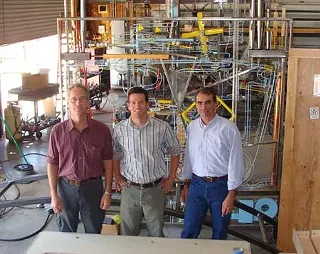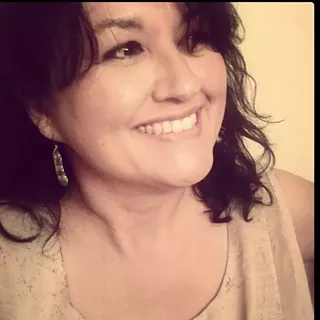In the industrial neighborhood south of Ajo Way, just down the street from Tucson Electric Park, imagination and science are coming together inside the walls of a plain-looking steel structure.
This is Joe O'Connell's Creative Machines, where designers, precision machinists and carpenters work on projects destined for children's museums and science centers far, far away from Tucson.
On one end of the machine shop are several ball machines, which look like super-large bird cages with tunnels and contraptions for balls to whiz through. Workers are putting on the final coats of paint before they get shipped to the East Coast.
O'Connell says that's how Creative Machines works: Whimsical works get dreamed up and made, and are then quickly shipped off. Occasionally, he's been able to do local projects—like the Bike Church in Barrio Anita, a conga-style interactive drum at Ochoa Park, and the red gryphon public sculpture on Scott Avenue—but most of the time, he sends works to places like Germany or Hawaii.
"It would be nice for more of this to stay in Tucson," O'Connell says, looking at project prototypes. "I don't really get a chance to see people interact with our exhibits."
That could change soon, depending on a collaboration between O'Connell and Joe Ruggiero, a past associate director of the UA Flandrau Science Center, as well as the Physics Factory, a Tucson-based science-education organization.
They want to create a local science center, and from their perspective, the time is just right. With the closure of Flandrau last spring, Tucson is without a science center for the first time in 30 years. A city the size of Tucson, according to Ruggiero, should have a science center.
UA administrators announced in the spring that Flandrau would indefinitely be closed due to the economy; plans to develop a new science center on the west side of downtown were also put on hold. A reduced staff at the Flandrau remained to work on grants and future science center planning. (See "Got Stars?" July 30.)
Employment contracts for Flandrau staff members were reportedly set to expire at the end of 2009, but according to Leslie P. Tolbert, UA's vice president for research, graduate studies and economic development, "The Science Center effort continues at the rate it has been at all year, and we have no plans to change that level of effort."
We contacted Flandrau executive director Alexis Faust for comment regarding the UA Science Center's status, but Tolbert responded. The Flandrau reports to Tolbert's office.
As Flandrau's future began to look bleak last spring, Ruggiero says he began to have conversations with friends like O'Connell, as well as Kip Perkins, a science teacher and Physics Factory board member.
Like O'Connell, Ruggiero is an independent exhibit designer. As owner of the Exhibit Guys, Ruggiero and his team in Tucson put together exhibits for museums and science centers all over the world.
Ruggiero got his start at the New York Hall of Science. Since starting his exhibit development business, like O'Connell, Ruggiero has seen his work go far from home. He estimates 10 to 15 percent of his work goes outside of the country.
For inspiration, Ruggiero and Perkins say they look to the Exploratorium, the San Francisco science center that has been housed in a former air plane hangar at the Palace of Fine Arts since 1969 and is filled with interactive exhibits made right on the premises.
Ruggiero says he thinks that by using this model, the proposed Tucson science center would cost less to start, because they would be using local talent and materials, and could easily attract volunteers.
"It doesn't have to be this big palace," Ruggiero says.
Right now, the proposed center has no formal name or an address, although Ruggiero says they've recently met with downtown property owners to find a suitable first space.
Michael Oppenheimer, who worked with Ruggiero at the New York Hall of Science, says if anyone can pull off a science center in Tucson, it's Ruggiero—but it won't be easy.
Oppenheimer should know. His father started the Exploratorium.
"That's where I cut my teeth, learning what it took to make rich and interesting exhibits," says Oppenheimer, who now lives in Bellingham, Wash. "(The Exploratorium) was an extension of my father's mind, so there was a lot of messing around and trial and error. ... A lot of people don't realize that building a really good exhibit for public use, for informal learning, is incredibly difficult."
Another key to the success of the Exploratorium was risk. Oppenheimer says O'Connell, Ruggiero and Perkins will have to be ready to take a lot of risk and not feel compelled to control every element of the exhibits.
"You have to allow the exhibit to go where it wants to go, and not where you think it should go. My father said to me once after a few years, 'I would have never dreamed that this is where we were going with this.'"
When asked whether cities like Tucson need science centers, Oppenheimer says that communities need questions presented to them that are worth asking and worth answering. Science centers provide this form of informal learning—which is an important part of creating a curious society.
Ruggiero says getting numerous people involved in planning and development will make a big difference.
"Right now, we have a lot of energetic people who want to get involved. That's what it's going to take to make this happen. We hope we continue to attract more people who want to see an independent science center start in Tucson," Ruggiero says.
The science guys hope they have a space identified by January or February, and say the center could be open in the spring.
"But it's important to note that we don't have all the answers," Ruggiero says. "That's a fundamental part of this project. We're not going to be finished when we open. It's just the beginning."
For more information, call the Physics Factory at 481-4960.









